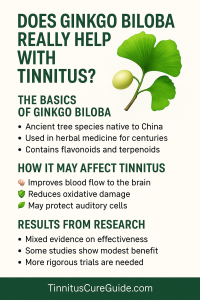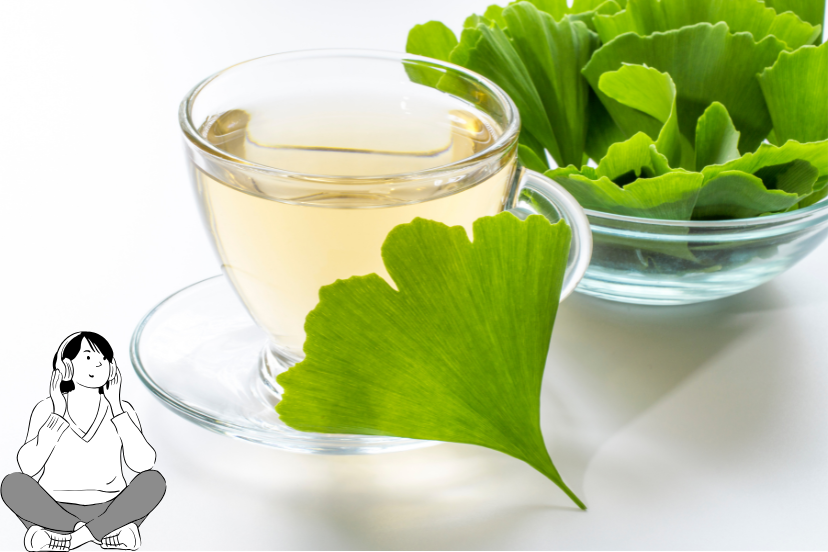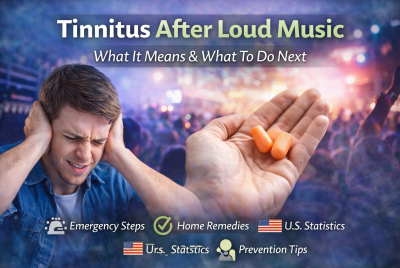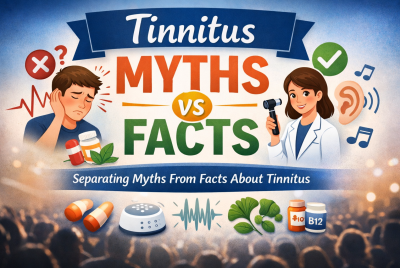Does Ginkgo Biloba Really Help With Tinnitus? What Science Says
🔊 Living With Tinnitus: Can a Natural Herb Really Help?
If you live with tinnitus, you know how draining it can be — that ringing, buzzing, hissing, or whooshing sound that no one else hears. Whether it’s constant or comes and goes, tinnitus can disrupt your sleep, focus, and emotional well-being.
Because there’s no one-size-fits-all cure, many people turn to natural remedies for relief. One of the most talked-about supplements is Ginkgo Biloba, a plant extract long used to support brain function and blood circulation.
But does it really work for tinnitus? Or is it just another herbal myth?
In this detailed guide, we’ll explore the science, benefits, dosage, and potential side effects of Ginkgo Biloba for tinnitus, plus real-life coping strategies and when to see a doctor.
🌿 What Is Ginkgo Biloba?
Ginkgo Biloba comes from the leaves of the ancient Ginkgo tree — one of the oldest living tree species on Earth. It’s often used to support memory, focus, and circulation, and has been studied for its effects on hearing and cognitive decline.
In the U.S., Ginkgo supplements are available over the counter as capsules, tablets, or liquid extracts. Many Americans use it for tinnitus, vertigo, and brain fog — conditions often linked to poor blood flow or nerve sensitivity.
🧠 How Ginkgo Biloba May Help Tinnitus
Tinnitus is often related to reduced blood flow, nerve damage, or stress. Ginkgo’s active compounds — flavonoids and terpenoids — have antioxidant and vasodilating (blood vessel–widening) properties that may improve ear function.
⚙️ 1. Improves Circulation to the Inner Ear
Healthy blood flow is crucial for the cochlea (the part of your ear responsible for converting sound waves into signals). Ginkgo Biloba helps increase oxygen and nutrient delivery to these delicate structures, supporting auditory health.
🧬 2. Protects Against Oxidative Damage
Free radicals can damage inner ear cells and contribute to hearing issues. Ginkgo’s antioxidants neutralize these harmful molecules, potentially reducing inflammation and nerve irritation.
💆♂️ 3. Calms Stress and Anxiety
Stress often worsens tinnitus. Studies show Ginkgo may help regulate cortisol levels and improve mood, making it easier to cope with ear ringing.
🔬 What Does Research Say About Ginkgo Biloba for Tinnitus?
Research on ginkgo biloba tinnitus relief is mixed — some studies show improvement, while others find little or no difference compared to placebo.
Here’s what key studies reveal:
🧾 Positive Findings
-
A 2011 review in the International Journal of Audiology found that Ginkgo Biloba improved tinnitus symptoms in some patients, particularly when taken early after onset.
-
A 2013 German study noted that patients with recent tinnitus (less than 3 months) reported reduced loudness and distress after using Ginkgo extract for 12 weeks.
-
A 2020 meta-analysis found that standardized extracts like EGb 761 may improve tinnitus severity when combined with lifestyle management.
❌ Inconclusive or Negative Results
-
A Cochrane Review of 12 clinical trials concluded that Ginkgo’s effects are not consistent, and results vary depending on dosage and duration.
-
Some researchers believe benefits may stem from improved circulation, but not from direct effects on tinnitus itself.
🧩 Takeaway: Ginkgo Biloba may help certain individuals — especially those with tinnitus caused by poor blood flow or stress — but it’s not guaranteed to work for everyone.
💊 Recommended Dosage and How to Take It
For tinnitus, most studies use standardized Ginkgo Biloba extracts like EGb 761.
Typical Dosage:
-
120–240 mg per day, divided into two or three doses.
-
Always start with a lower dose and increase gradually under your doctor’s supervision.
Best Taken:
-
With meals for better absorption.
-
Consistently for at least 6–12 weeks, as effects can take time.
🩺 Tip: Choose U.S.-based supplements labeled with 24% flavone glycosides and 6% terpenoids — the standardized concentration used in clinical research.
⚠️ Possible Side Effects and Precautions
While Ginkgo Biloba is considered safe for most adults, it’s not for everyone.
Common Mild Side Effects:
-
Upset stomach
-
Headache
-
Dizziness
Serious Risks (Rare):
-
Increased bleeding risk if taken with blood thinners (like warfarin, aspirin, or ibuprofen)
-
Allergic skin reactions in sensitive individuals
🚫 Avoid Ginkgo Biloba if you:
-
Are you pregnant or breastfeeding
-
Have a bleeding disorder
-
Are scheduled for surgery within 2 weeks
Always talk with your healthcare provider before starting supplements — especially if you take medications for blood pressure or heart conditions.
🧩 Combining Ginkgo Biloba With Lifestyle Strategies
Ginkgo works best as part of a comprehensive tinnitus management plan that includes stress reduction, healthy habits, and sound therapy.
💆 Relaxation Techniques
-
Practice deep breathing or mindfulness meditation daily.
-
Use progressive muscle relaxation before bed to ease tension.
💤 Improve Sleep Quality
-
Use a white noise machine or app (like myNoise or Calm) to mask tinnitus at night.
-
Avoid caffeine and electronics before bedtime.
🥗 Eat for Ear Health
-
Include magnesium-rich foods (spinach, pumpkin seeds).
-
Add omega-3s (salmon, chia seeds) for better nerve function.
-
Limit salt, alcohol, and processed sugar, which can worsen tinnitus.
🎧 Try Sound Therapy
-
Gentle background noise helps retrain your brain to “tune out” the ringing.
-
Some hearing aids include built-in tinnitus masking programs for continuous relief.
🌿 Ginkgo Biloba Alternatives for Tinnitus Relief
If Ginkgo Biloba isn’t effective for you, other natural tinnitus remedies may help:
-
Magnesium: Calms nerve excitability and stress.
-
Zinc: Supports hearing function in zinc-deficient individuals.
-
Vitamin B12: Helps repair auditory nerve damage.
-
Acupuncture: Improves blood flow and reduces ear ringing.
-
Herbal blends (like garlic, hawthorn, and turmeric): Lower inflammation and improve circulation.
Each of these can complement or substitute Ginkgo in a natural relief plan.
🩺 When to See a Doctor
While ginkgo biloba tinnitus treatment can help, some cases require professional attention. Seek medical advice if you experience:
-
Tinnitus in one ear only
-
Sudden or severe hearing loss
-
Ear pain, drainage, or pressure
-
Dizziness or balance problems
-
Tinnitus that pulses with your heartbeat (pulsatile tinnitus)
Your doctor may perform hearing tests, imaging scans, or refer you to an ENT or audiologist to identify underlying causes like earwax buildup, infection, or high blood pressure.
❓ FAQs About Ginkgo Biloba and Tinnitus
1. Does Ginkgo Biloba really cure tinnitus?
No, it doesn’t cure tinnitus completely, but it may reduce intensity and improve comfort — especially for cases related to poor circulation or stress.
2. How long does it take for Ginkgo Biloba to work for tinnitus?
Most people notice subtle improvement after 6–12 weeks of consistent use. Patience and daily routine are key.
3. Can Ginkgo Biloba make tinnitus worse?
It’s rare, but some people report temporary headaches or mild stimulation. If symptoms worsen, stop use and consult your doctor.
4. What is the best brand of Ginkgo Biloba for tinnitus in the U.S.?
Look for brands like Nature’s Way, NOW Foods, or Doctor’s Best that use standardized extracts (EGb 761) and have third-party testing.
5. Is it safe to take Ginkgo Biloba with other supplements?
Usually yes, but avoid mixing with blood thinners or high doses of vitamin E unless supervised by a healthcare professional.
6. Can Ginkgo Biloba help with age-related hearing loss?
Some research suggests it may improve cognitive and hearing function in older adults by enhancing blood flow and protecting nerves.
7. Should I take Ginkgo Biloba in the morning or at night?
Morning and midday are best — Ginkgo can have a mild stimulating effect that might interfere with sleep.
🌅 Conclusion: A Promising Natural Option for Some
While Ginkgo Biloba isn’t a miracle cure, it remains one of the most promising natural supplements for tinnitus relief. Its ability to boost circulation, protect nerve cells, and calm stress may make a real difference for many sufferers — especially when combined with healthy habits and relaxation techniques.
If you’re considering Ginkgo Biloba for tinnitus, give it time — 8 to 12 weeks of consistent use — and track your progress in a journal. For best results, pair it with sound therapy, sleep hygiene, and a balanced diet.
🌿 Tinnitus may not disappear overnight, but with patience and the right support, peace and quiet can return to your life.
⚠️ Disclaimer
This article is for informational purposes only and is not intended as medical advice. Always consult a qualified healthcare provider before starting supplements, changing medications, or beginning new tinnitus treatments.

- How to Sleep Better With Tinnitus
- 10 Natural Remedies for Tinnitus That Actually Work
- 5 Simple Relaxation Techniques to Calm Tinnitus Naturally






